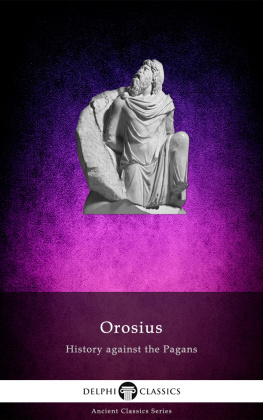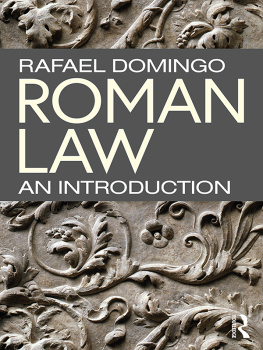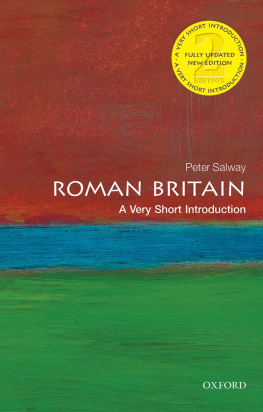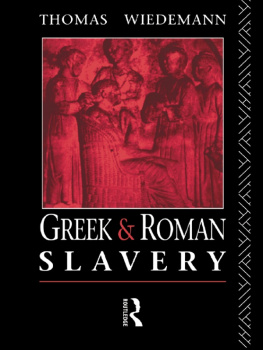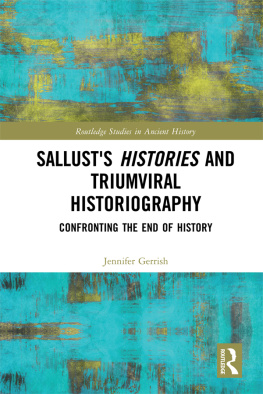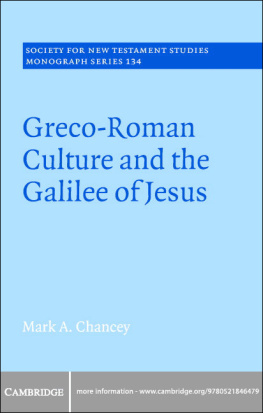This series will provide concise introductions to classical culture in the broadest sense. Written by the most distinguished scholars in the field, these books survey key authors, periods and topics for students and scholars alike.
Charles W. Hedrick, Jr.
Barry B. Powell
R. Alden Smith






Chapter 1:
Chapter 2:
Chapter 3:
Chapter 4:
Chapter 5:
Chapter 6:
Chapter 7:
Chapter 8:


Andreas Mehl's title, Roman Historiography: An Introduction to its Basic Aspects and Development, is deceptively modest. Rooting his erudite and readable discussion in the context of its Greek antecedents, Mehl traces ancient historical writing about Rome from its beginnings (clan history, Annales) to its ends in both West (Orosius) and East (Procopius). What is astonishing is not that Mehl manages to discuss by name almost every historical writer of even fragmentary significance (or less) or even that he looks at their works in terms of essential themes (e.g. genre, teleology, the idea of Rome, exemplary moral conduct; he summarizes all this in Chapter 8). Rather, two features stand out: scrupulous attention to political context and to religious developments. These twin lenses allow us to observe the evolution (and interpenetration) of classically religious and Christian historiography - with novel insights. One example: many scholars dismiss Zosimus (fifth/sixth century AD) as derivative. Mehl, on the other hand, discovers a brilliant counterpart to Polybius (second century BC). Why? Both authors offered original interpretations of Roman history on the basis of religion. Bibliography, a catalogue of authors and editions, and an index lend added utility. Mehl's book should constitute required reading for serious students of Roman history and ancient religion, Christian or classical.
Scholars of Roman historiography, on the other hand, at least in the English-speaking world, may feel some disorientation when first they take this volume in hand. Much will seem familiar. Our scholarship too deals with truth, fiction, exemplarity, genre, narrative, rhetorical tropes. But Mehl's approach is not as literary. Politics, law, religion, Roman institutions, are integrated into the very texture of his argument. Mehl rescues more historical truth from ancient historiography than we have grown accustomed to expect from the more recent historiographical emphasis in English-language scholarship on ancient rhetoric. This scholarship, although it is certainly a factor in Mehl's survey, does not stand at its center. Mehl engages rather the German-language scholarship of Albrecht Dih1e and Dieter Timpe, to name just two examples, with an immediate intensity scholarship in English generally reserves for such luminaries as Woodman or Wiseman. And, for this reason too, Mehl in English should appeal. This translation provides a snapshot of continental scholarship's approach to Roman historiography in a language more readily accessible to English-speaking scholars and students alike than the book's original academic German (a language no longer as widely or easily understood among us - to our loss).
A word of confession is in order. On Andreas Mehl's behalf and with his encouragement, I first proposed this translation in 2002. Al Bertrand, then editor of a rapidly growing catalogue in Classics, readily agreed, and asked me to translate. Serving as translator was not my original plan, nor was it in my proposal, but I believed in the book's importance, and (perhaps too) quickly agreed. Personal vicissitudes (pedestrian though they were) intervened, and work did not proceed smoothly, but the patience of Wiley-Blackwell, and the equally patient, but insistent, prods of subsequent editors, Haze Humbert and Galen Smith, kept my work on its slow and increasingly steady track to completion. I owe all three editors an enormous debt of gratitude, and offer here my public and sincerest thanks. When I completed a draft in March 2010, things began to proceed rapidly. Despite a busy term at his university, speaking engagements, and numerous editorial deadlines for his current projects, Andreas Mehl read through the entire translation, and offered detailed corrections. I thank him for his patience, good humor, and cheerful diligence under pressure. An anonymous reviewer also read the entire draft, correcting matters of both substance and style. To him too I offer my many and grateful thanks. Only for errors and infelicities that remain do I insist on full credit.
Hans-Friedrich Mueller


